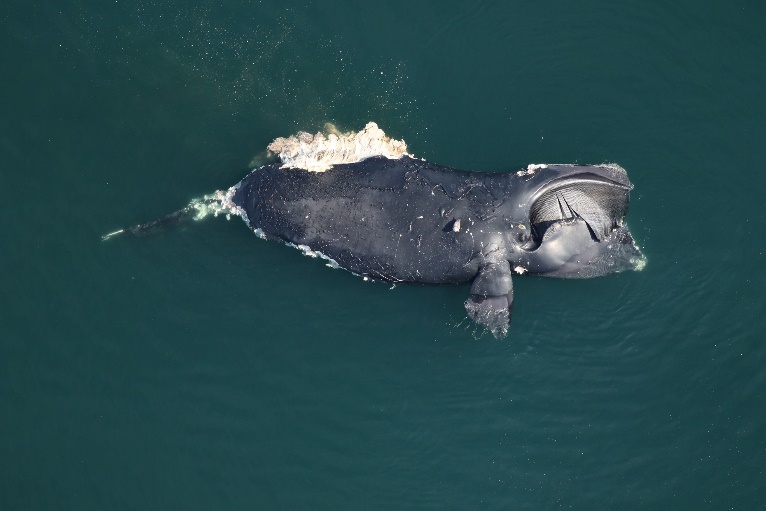
NOAA drops update vessel to speed rules intended to protect whales
With the Biden administration’s time in office coming to an end, regulators at the National Oceanic and Atmospheric Administration on Wednesday gave up on trying to finalize changes to the rules in place to reduce the likelihood of fatal collisions between boats and North Atlantic right whales, changes that would have impacted Cape Cod and the Islands.
The changes NOAA initially proposed in July 2022 would have expanded the size and duration of seasonal vessel speed restrictions that aim to keep the endangered whales safe along the U.S. East Coast, including by adding Nantucket and Martha’s Vineyard sounds to the territory.
The changes would have also expanded mandatory speed restrictions to include most vessels 35 feet to 65 feet in length.
Gov. Maura Healey, who urged NOAA in a letter last month not to implement the proposed changes, celebrated the announcement Wednesday that NOAA was withdrawing the proposal “in light of numerous and ongoing requests from the public for further opportunity to review and engage with the Agency.”
“We’re grateful to NOAA for listening to our concerns about their proposed changes to the North Atlantic right whale vessel speed rule. This decision is good news for residents and businesses on Cape Cod and the Islands, and we look forward to continuing to work together to protect right whales and the local economy,” Healey said.
The New England Aquarium called the decision a “serious setback for the critically endangered North Atlantic right whale,” saying that in the last two years “there have been at least four deaths and five injuries due to vessel strikes in U.S. waters.”
“The situation is dire for this species,” the aquarium continued, with around 370 individuals remaining in the population and only about 70 breeding females.
“Failing to implement stronger vessel strike protection measures puts these animals at further risk of extinction. To survive, right whales require immediate, decisive, and effective solutions to protect individuals from preventable deaths,” said Dr. Jessica Redfern of the aquarium’s Anderson Cabot Center for Ocean Life.
Healey told NOAA last month that including the waters of Martha’s Vineyard and Nantucket sounds — where “no vessel strikes have been documented … despite the relatively high volume of vessel traffic,” she said — “would not meaningfully increase protection for this endangered species but would have devastating impacts on residents and businesses on Cape Cod and the Islands.”
The Steamship Authority, which runs ferries between Cape Cod and the two islands, was also opposed to NOAA’s proposal, telling the regulators in a 2022 letter that, if the changes were to go into effect, the company would have to eliminate one-third of its year-round traditional ferry roundtrips and eliminate its high-speed service to Nantucket during the early spring and late fall.
“The elimination of these essential services will provide less transportation capacity to island residents, cause delays in the delivery of goods to the island and result in a fundamental shift in the lifestyle of the island residents as ferry travel will become more crowded, more time consuming, and expensive as the Authority anticipates longer operating days and as a result increasing cost,” the Steamship Authority wrote in a letter reported on by the Martha’s Vineyard Times. “Further, the island’s tourist and hospitality economies will suffer significant reductions without fast, timely and reliable high-speed ferry service to deliver passengers to the island.”
NOAA said it received about 90,000 public comments on its proposed rule, addressing “many different aspects of the rule” and reflecting views on all sides. The overwhelming public interest made it impossible for regulators to finish their work before President Joe Biden leaves office on Monday.
“Despite its best efforts, [National Marine Fisheries Service] does not have sufficient time to finalize this regulation in this Administration due to the scope and volume of public comments,” the agency said.
The population of North Atlantic right whales has seen a slight increase in recent years, with the latest estimate from the the North Atlantic Right Whale Consortium being that there are 372 right whales remaining, up from a low of 358 as of 2020. The species had an estimated 481 whales in 2011.
Right whales got their name, NOAA said, “from being the ‘right’ whales to hunt because they floated when they were killed.” Nantucket and New Bedford thrived as whaling ports in the 18th and 19th centuries, but the expeditions that helped fuel the Industrial Revolution severely depleted whale populations. Northern right whales have been listed as endangered since 1970.
Now as New Bedford and other former New England whaling ports aim for revitalization through the offshore wind industry, the industry had to overcome headwinds from two federal lawsuits that focused on the protection of endangered species like the North Atlantic right whale and commercial fishing interests.
There has been an “unprecedented” number of whale strandings along the south shore of Massachusetts this year, officials from the Plymouth-based nonprofit Whale and Dolphin Conservation said last month.
WDC suggested that “a notable increase of forage fish closer to the coast of Massachusetts” in recent years “has brought whales nearer to shoreline where the chances of finding animals who were entangled, struck, or sick, has risen.”
Since 2016, NOAA has declared several “unusual mortality events” for large whales along the east coast of the U.S., noting an increase in strandings of humpback, minke and North Atlantic right whales. NOAA said examinations indicate the primary causes of death are accidental entanglements in fishing gear, vessel strikes or infectious disease, and that “[t]here are no known links between large whale deaths and ongoing offshore wind activities.”
An official with the international ocean conservation group Oceana called NOAA’s decision “bureaucracy at its finest.”
“North Atlantic right whales don’t belong on our beaches, and they don’t deserve to die because of political incompetence and a blatant disregard for science-backed solutions,” said Oceana Campaign Director Gib Brogan. “We hate to state the obvious but, we need a solution, and we need it now. It’s our sincere hope that the new administration does not want the first large whale to go extinct in centuries in U.S. waters because of federal red tape. The Trump administration must find a solution that keeps fisheries on the water, sustains the marine economy, and supports the recovery of the North Atlantic right whale.”


